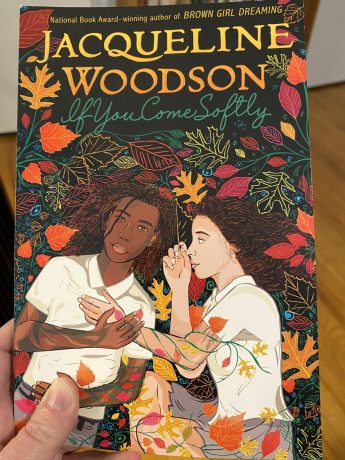On Tuesday, May 16, the Great Neck Public School District will hold its election for the school board and school budget. As of this writing, only one board member has an opponent. A candidate named Niloufar Tabari is running against Rebecca Sassouni, who is the current president of our school board and has been on the board since 2017.
I don’t know anything about Niloufar Tabari’s reasons for running, apart from the fact that she has four children in our schools, and has been involved in SEPTA and the PTA. However, I recently viewed a video of Tabari speaking at a school board meeting on October 20th, 2021, at E.M. Baker. The video is posted on the Great Neck Public Schools’ YouTube channel, and anyone can watch it.
In this video, Tabari zeroes in on a book that she feels was inappropriate for her children to read. The book is called If You Come Softly, by Jacqueline Woodson. It was picked as an ALA Best Book for Young Artists, a Bulletin Blue Book Ribbon Book, and received a starred review from Publishers Weekly. Woodson, the author, has received the National Book Award, among other honors.
Tabari claimed in her speech that this book teaches children that “all white people are racist.”
Tabari’s shocking allegation made me want to read the book myself. So last night, I sat down to read this book. It’s a beautifully written tragic love story about a Jewish girl and a Black boy who fall in love. The bulk of the book is about their love story, and while aspects of race are brought up and certainly have an impact, that is not the main thrust of this book.
I read the book carefully, and nowhere does it suggest (as Tabari claimed) that “all white people are racist.” In fact, it shows just the opposite: it shows kindness from white characters, and an effort on the part of the main white characters to understand the struggles of the characters who are Black. Yes, racism comes up in the book, and has significant impacts on the plot and characters, but there is absolutely no suggestion that “all white people are racist.”
Tabari also claimed in her speech that the book portrays the main character’s Jewish family as “racist” and she explained what she considers the “real reason” for a Jewish family to disapprove of such a relationship: “This is not racist, as is implied; this is about religious beliefs, and preserving a rich culture that is thousands of years old,” Tabari says.
First of all, the book does not even portray the main character’s family as disapproving. There is a single scene in which her sister indicates concern, but not disapproval. The main character’s parents don’t even know about the relationship until it tragically ends, and then they lovingly try to soothe the girl’s grief. The family does not come across as racist in this book.
As I read the book, I found myself wondering whether Tabari even read it at all. She finished her speech by claiming that this book is inappropriate for her children, because it would teach them that there is something wrong with their Jewish culture. “It is not right to diminish one people, the Jewish people, in order to teach about the hardships of another people,” Tabari says. “It is also not the place of our school system to tell our kids how to preserve our Jewish culture.”
It is absolutely untrue that this book does any of these things. It does not portray all white people as racist, nor does it “diminish” the Jewish people or make claims about how to preserve Jewish heritage. It concerns me that someone would run for school board who would make such sweeping claims about a piece of literature without seeming to have read it. Moreover, Tabari should be aware that the job of the school board is not to police the books the teachers teach. Curriculum is overseen by our state and by our highly trained educational professionals.
If a parent feels uncomfortable with a book, that’s okay—they have a right to feel that way. But their discomfort cannot dictate what books are taught to our children. Make no mistake: this is how book bans start. And unless you’ve been living under a rock, it’s clear that book bans are making a comeback in our country, thanks in no small part to the kind of rhetoric Tabari displayed at the school board meeting in 2021.
Making false accusations about books—and about messages that books and teachers want to impart to our kids—is not only wrong, it’s dangerous. It feeds into an atmosphere of distrust, deepening the divisions in our community. We are a diverse, vibrant school district and all voices should be represented in the materials our students are taught.
The fact that there are books about characters who have different identities than our own kids is a good thing—our children need to be exposed to people and cultures that are different from their own. That helps build social consciousness and empathy.
I will be wholeheartedly voting for both Rebecca Sassouni and Joanne Chan for school board on May 16th. Both value diversity and inclusion in our district, and the important role that highly trained educators play in setting our school curriculum.
Wendy Wisner
Great Neck

